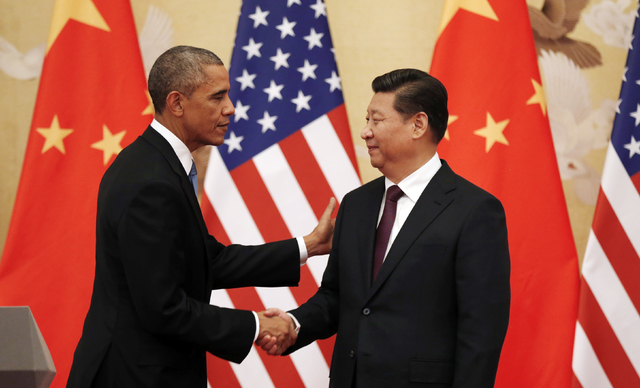Scholars envision feasible model of China-US relations

Chinese President Xi Jinping hosts US President Barack Obama for a state visit on Nov. 10-12, 2014. Xi outlined six priorities in building a new type of major-country relationship with the United States.
A symposium titled “China-US New Model Major-Country Relations: Theories and Measures” was held in Beijing recently by the Academic Division of International Studies at the Chinese Academy of Social Sciences (CASS) and American Studies Quarterly published by the Institute of American Studies at CASS.
Scholars conducted in-depth discussions on the historical basis of the new model of major-country relations between China and the United States as well as practical demands, potential areas for cooperation and other related topics.
Building a new model of major-country relations involves a wide range of areas and a series of complicated issues. Scholars agreed that the highest priority is to construct a theoretical basis.
Xu Jian, a research fellow from China Institute of International Studies, emphasized the need to construct theories. Judging from historical and current conditions, it is quite feasible to build a new model of relations between the two countries through joint efforts, Xu said.
He elaborated on issues that hold potential for theoretical breakthroughs. One is the role of power. The new model of relations should overcome the misconception that equality is only based on the balance of power, Xu said. The second is how to view benefits. The two countries have more common ground than disputes. Therefore, the two sides can reach mutual recognition in values. The third is that the two sides should focus on mutual benefit rather than expecting one side to compromise for the other.
Da Wei, director of the Institute of American Studies at the China Institute of Contemporary International Relations, proposed six key areas for building a new model of major-country relations—mutual strategic deterrence in the cyberspace, effective crisis control and management, China’s political security, interdependence in economy and trade, maintenance of the existing international regime, and people-to-people exchanges between the two sides.
The two countries should develop the idea of cooperation while exploring more common ground, said Li Zhifei, an associate research fellow from the National Institute of International Strategy at CASS. She added that there are many opportunities for cooperation in non-traditional security areas, like law enforcement in network security. In this process, strategic trust is both the foundation of and a source of momentum for cooperation, she said.
Another area scholars stressed is climate change. Li Qiang, deputy dean of the School of Law and Political Science at Tianjin Foreign Studies University, specified related issues in this area, including scientific understanding of climate change, the interests of the two sides, and political willingness. Moreover, cooperation in climate change can strengthen the sense of responsibility as major countries, he said.
Pan Yufei is a reporter at the Chinese Social Sciences Today.
